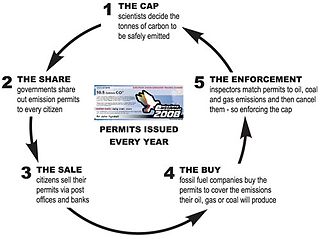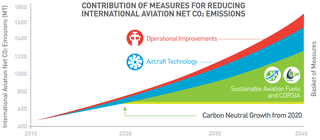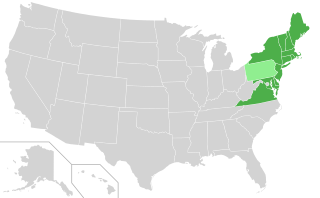 W
WThe American Clean Energy and Security Act of 2009 (ACES) was an energy bill in the 111th United States Congress that would have established a variant of an emissions trading plan similar to the European Union Emission Trading Scheme. The bill was approved by the House of Representatives on June 26, 2009 by a vote of 219-212, but was never brought to the floor of the Senate for discussion or a vote.
 W
WCap and Share was originally developed by Feasta and is a regulatory and economic framework for controlling the use of fossil fuels in relation to climate stabilisation. Accepting that climate change is a global problem and that there is a need to cap and reduce greenhouse gas emissions globally, the philosophy of Cap and Share maintains that the earth’s atmosphere is a fundamental common resource. Consequently, it is argued, each individual should get an equal share of the benefits from the limited amount of fossil fuels that will have to be burned and their emissions released into the atmosphere in the period until the atmospheric concentration of greenhouse gases has been stabilised at a safe level.
 W
WEmission trading (ETS) for carbon dioxide and other greenhouse gases (GHG) is a form of carbon pricing. It is an approach to limit climate change by creating a market with limited allowances for emissions. This can lower competitiveness of fossil fuels and accelerate investments into low carbon sources of energy such as wind power and photovoltaics. Fossil fuels are the main driver for climate change. They account for 89% of all CO2 emissions and 68% of all GHG emissions.
 W
WThe Carbon Offsetting and Reduction Scheme for International Aviation (CORSIA) is a carbon offset and carbon reduction scheme to lower CO2 emissions for international flights, to curb the aviation impact on climate change.
 W
WThe Carbon Pollution Reduction Scheme was a cap-and-trade emissions trading scheme for anthropogenic greenhouse gases proposed by the Rudd government, as part of its climate change policy, which had been due to commence in Australia in 2010. It marked a major change in the energy policy of Australia. The policy began to be formulated in April 2007, when the federal Labor Party was in Opposition and the six Labor-controlled states commissioned an independent review on energy policy, the Garnaut Climate Change Review, which published a number of reports. After Labor won the 2007 federal election and formed government, it published a Green Paper on climate change for discussion and comment. The Federal Treasury then modelled some of the financial and economic impacts of the proposed CPRS scheme.
 W
WEmber, formerly Sandbag or Sandbag Climate Campaign, is an environmental non-profit think tank, campaigning to reduce the use of coal. Based in the UK, the organisation was launched in 2008 by Bryony Worthington and was the first member of The Guardian's Environment Network.
 W
WThe European Union Emissions Trading System (EU ETS), was the first large greenhouse gas emissions trading scheme in the world. It was launched in 2005 to fight global warming and is a major pillar of EU energy policy. As of 2013, the EU ETS covers more than 11,000 factories, power stations, and other installations with a net heat excess of 20 MW in 31 countries—all 27 EU member states plus Iceland, Norway, Liechtenstein and United Kingdom. In 2008, the installations regulated by the EU ETS were collectively responsible for close to half of the EU's anthropogenic emissions of CO2 and 40% of its total greenhouse gas emissions. The EU had set a target for 2020 to cut greenhouse gas emissions by 20% compared with 1990, to reduce energy consumption by 20% compared to the 2007 baseline scenario, and to achieve a 20% share of gross final energy consumption from renewable energy sources - all of which was achieved. A 2020 study estimated that the EU ETS had reduced CO2 emissions by more than 1 billion tons between 2008 and 2016 or 3.8% of total EU-wide emissions.
 W
WThe Greenhouse Gas Pollution Pricing Act is a Canadian federal law establishing a set of minimum national standards for carbon pricing in Canada to meet emission reduction targets under the Paris Agreement. It was passed as Part 5 of the Budget Implementation Act, 2018, No. 1 – an omnibus budget bill – during the 42nd Parliament of Canada. The law came into force immediately upon receiving royal assent on June 21, 2018. In Canada, it is commonly known as the "Carbon Tax".
 W
WThe New Zealand Emissions Trading Scheme is a partial-coverage all-free allocation uncapped highly internationally linked emissions trading scheme. The NZ ETS was first legislated in the Climate Change Response Amendment Act 2008 in September 2008 under the Fifth Labour Government of New Zealand and then amended in November 2009 and in November 2012 by the Fifth National Government of New Zealand.
 W
WThe Regional Greenhouse Gas Initiative (RGGI, pronounced "Reggie") is the first mandatory market-based program in the United States to reduce greenhouse gas emissions. RGGI is a cooperative effort among the states of Connecticut, Delaware, Maine, Maryland, Massachusetts, New Hampshire, New Jersey, New York, Rhode Island, Vermont, and Virginia to cap and reduce carbon dioxide (CO2) emissions from the power sector. RGGI compliance obligations apply to fossil-fueled power plants 25MW and larger within the ten-state region. As of 2021, Pennsylvania is pending RGGI membership with an anticipated start in early 2022, and North Carolina is currently considering joining RGGI.
 W
WWestern Climate Initiative, Inc. (WCI) is a 501(c)(3) non-profit corporation which administers the shared emissions trading market between the American state of California and the Canadian province of Quebec as well as separately administering the emissions trading market of the Canadian province of Nova Scotia. It also provides administrative, technical and infrastructure services to support the implementation of cap-and-trade programs in other North American jurisdictions. The organization was originally founded in February 2007 by the governors of five western states with the goal of developing a multi-sector, market-based program to reduce greenhouse gas emissions; it was incorporated in its current form in 2011.